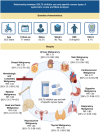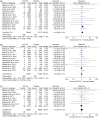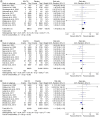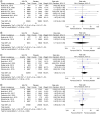Relationship between SGLT2 inhibitor use and specific cancer types: a systematic review and meta-analysis
- PMID: 39344829
- PMCID: PMC11444652
- DOI: 10.1080/20565623.2024.2400797
Relationship between SGLT2 inhibitor use and specific cancer types: a systematic review and meta-analysis
Abstract
Aim: The study aimed to explore the incidence of cancer as an adverse event to SGLT2 inhibitors (SGLT2i) use in Type 2 diabetes.Materials & methods: The study followed PRISMA guidelines to pool RCTs conforming the inclusion criteria. Random effects model was used to pool risk ratios.Results & conclusion: After reviewing 19 studies, the analysis suggested a possible increased risk of reproductive, breast, thyroid, hematologic/lymphatic, urinary, skin and skeletal cancers with SGLT2i use. Conversely, lower incidences of respiratory and cardiovascular cancers were noted. However, these associations lacked statistical significance. Caution is advised in using SGLT2i due to potential cancer risks, especially in diabetic patients prone to cancer. More RCTs are essential due to limited research in this area.
Keywords: SGLT2 inhibitors; antidiabetic medication; cancer incidence; cancer risk; diabetes mellitus; malignancy; meta-analysis; organ specific cancers; sodium-glucose transport protein 2 inhibitors; type 2 diabetes mellitus.
Plain language summary
SGLT2 inhibitors, widely used to manage Type 2 diabetes, provide benefits for blood sugar control, cardiovascular health and kidney function. However, their impact on cancer risk remains unclear. This review and meta-analysis examined randomized controlled trials to evaluate cancer outcomes in adults using SGLT2 inhibitors. Findings indicated mixed effects on various cancer types, with some inhibitors potentially increasing risk while others showed no significant impact. Further research is essential to clarify the relationship between SGLT2 inhibitors and cancer.
Figures





Similar articles
-
Cardiovascular outcomes associated with SGLT2 inhibitor therapy in patients with type 2 diabetes mellitus and cancer: a systematic review and meta-analysis.Diabetol Metab Syndr. 2024 May 22;16(1):108. doi: 10.1186/s13098-024-01354-4. Diabetol Metab Syndr. 2024. PMID: 38773486 Free PMC article.
-
Sodium-glucose co-transporter-2 inhibitors and the risk of diabetic ketoacidosis in patients with type 2 diabetes: A systematic review and meta-analysis of randomized controlled trials.Diabetes Obes Metab. 2020 Sep;22(9):1619-1627. doi: 10.1111/dom.14075. Epub 2020 May 21. Diabetes Obes Metab. 2020. PMID: 32364674
-
Sodium-Glucose Cotransporter 2 Inhibitors and New-onset Type 2 Diabetes in Adults With Prediabetes: Systematic Review and Meta-analysis of Randomized Controlled Trials.J Clin Endocrinol Metab. 2022 Dec 17;108(1):221-231. doi: 10.1210/clinem/dgac591. J Clin Endocrinol Metab. 2022. PMID: 36217306
-
Effect of sodium-glucose cotransporter-2 inhibitors on myocardial infarction incidence: A systematic review and meta-analysis of randomized controlled trials and cohort studies.Diabetes Obes Metab. 2024 Mar;26(3):1040-1049. doi: 10.1111/dom.15405. Epub 2023 Dec 12. Diabetes Obes Metab. 2024. PMID: 38086546
-
Effects of SGLT2 inhibitors on cardiac function and health status in chronic heart failure: a systematic review and meta-analysis.Cardiovasc Diabetol. 2024 Jan 3;23(1):2. doi: 10.1186/s12933-023-02042-9. Cardiovasc Diabetol. 2024. PMID: 38172861 Free PMC article.
References
-
- Brown E, Heerspink HJL, Cuthbertson DJ, Wilding JPH. SGLT2 inhibitors and GLP-1 receptor agonists: established and emerging indications. Lancet. 2021;398(10296):262–276. Available from: https://linkinghub.elsevier.com/retrieve/pii/S0140673621005365 - PubMed
-
- Gilbert MP. Screening and treatment by the primary care provider of common diabetes complications. Med Clin North Am. 2015;99(1):201–219. Available from: https://linkinghub.elsevier.com/retrieve/pii/S0025712514001503 - PubMed
-
- Tseng C-H. Metformin is associated with a lower risk of colorectal cancer in Taiwanese patients with Type 2 diabetes: a retrospective cohort analysis. Diabetes Metab. 2017;43(5):438–445. Available from: http://www.ncbi.nlm.nih.gov/pubmed/28438547 - PubMed
Publication types
LinkOut - more resources
Full Text Sources
Other Literature Sources
